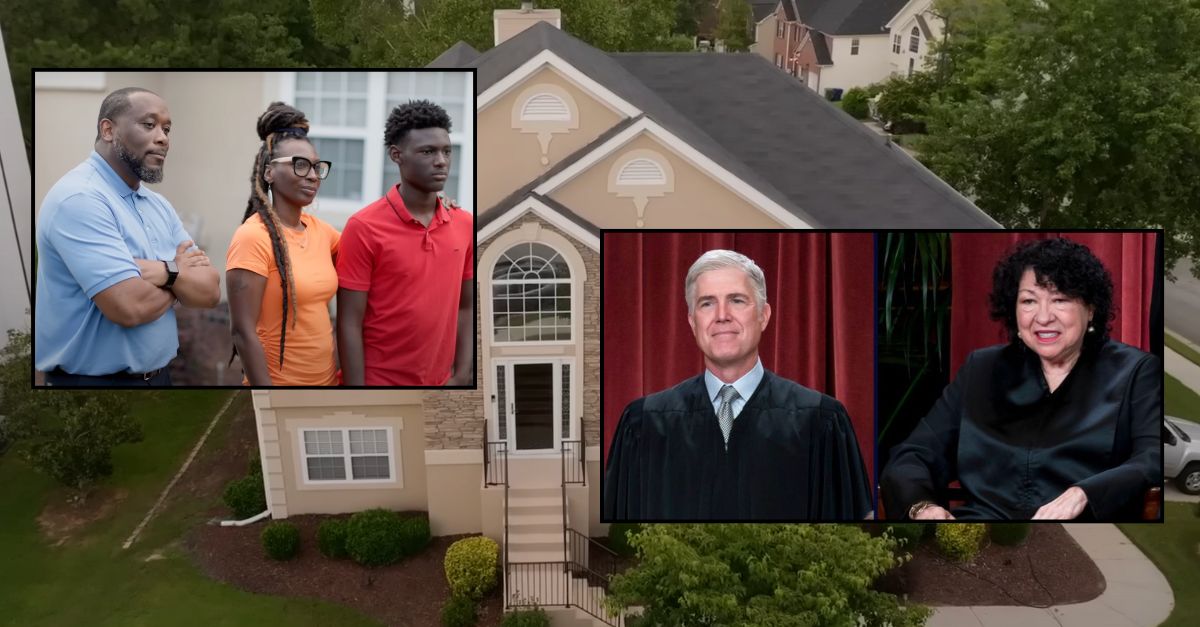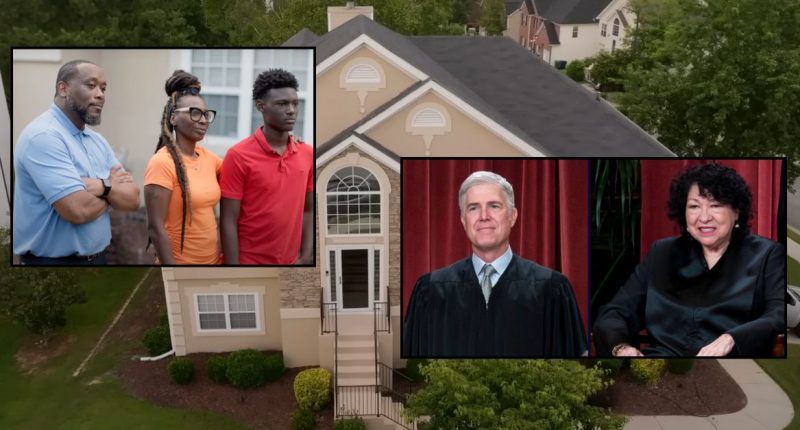
Background: The Martin-Cliatt family home in Atlanta, Georgia (Institute for Justice). Inset top, left to right: Hilliard Toi Cliatt, Curtrina Martin, Martin’s son Gabe (Institute for Justice); Inset, bottom: Left: Justice Neil Gorsuch. Right: Justice Sonia Sotomayor (Erin Schaff-Pool/Getty Images).
The justices heard fast-tracked oral arguments Tuesday in the case of a Georgia family whose home was mistakenly raided by an FBI SWAT team.
Six FBI agents in full tactical gear set out to raid a home and execute a “no-knock” arrest warrant at 3:30 a.m. on Oct. 18, 2017, as part of the FBI’s “Operation Red Tape,” an initiative to combat gang violence in Georgia that began in 2015.
The officer in charge knocked and announced their presence while another agent set off a flash-bang — a nonlethal stun grenade — at the entrance as the team entered the home.
Although the team had scoped out the target location before the raid, no one noticed when the officers’ GPS directed them to a nearby, similar-looking home. The result was that Curtrina Martin, Hilliard Toi Cliatt, and Martin’s son Gabe, who was then 7 years old, were subjected to a harrowing experience.
Martin and Cliatt hid in the bedroom closet, thinking their home was being burglarized, before an officer dragged Cliatt onto the bedroom floor with guns pointed at him. Meanwhile, Martin fell into the closet while another SWAT team member pointed a gun in her face and yelled for her to keep her hands up. The child, Gabe, was separated from both adults while the team executed the warrant.
Once the lead officer realized the team had been raiding the wrong house, he apologized and told the family that the FBI would handle any damage to their home. However, when no repairs or compensation were forthcoming, Martin and Cliatt filed a lawsuit represented by advocacy group The Institute for Justice (IJ) for false arrest, negligence, false imprisonment, and assault and battery.
Although the federal government is usually immune from lawsuits, the Federal Tort Claims Act (FTCA) waives that immunity in certain circumstances, including when a plaintiff has a state-law claim stemming from a government official’s performance of a discretionary duty that advances federal policy.
The lawsuit’s claims against FBI Special Agent Lawrence Guerra, who led the raid, were dismissed by the district court in Georgia on qualified immunity grounds. The U.S. Court of Appeals for the 11th Circuit agreed, taking the unusual position that the lawsuit was barred by the supremacy clause of the United States Constitution. The result is that the justices now face a complex legal question that involves the interplay between state and federal law, and whether the mistaken warrant execution was a “discretionary duty” on the part of the officers. Under the FTCA, the “discretionary function exception” protects federal agents from liability for routine judgment calls.
The mood was relatively calm at the Supreme Court on Tuesday as attorneys advanced their arguments. The justices, for their part, confined most of their discussion to the wisdom and practicality of the Court’s establishing a firm rule on FTCA immunity.
Two justices who typically occupy opposite ends of the ideological spectrum, however, brought the discussion back to the reality at hand: a family that was traumatized by a serious police error.
Justice Sonia Sotomayor pressed Assistant to the Solicitor General Frederick Liu about Congress’ intent when it amended the FTCA in response to the 1973 Collinsville, Illinois raids, in which a federal raid team set up by President Richard Nixon to combat “Public Enemy No. 1” targeted the wrong home without a warrant. Sotomayor argued that the wrong-house raid on the Martin house was precisely the kind of event Congress contemplated when amending federal law to allow for liability.
Likewise, Justice Neil Gorsuch seemed similarly unwilling to accept Liu’s argument that the officers’ actions in the current case were “discretionary” under the law.
“You might look at the address of the house before you knock down the door,” Gorsuch commented sardonically.
Liu argued that warrant executions require “trade-offs” such as officers’ choosing not to double-check a house number in an effort to maintain their cover. Gorsuch was not having it.
“How about making sure you’re on the right street?” Gorsuch asked. “Just the right street? Checking the street sign? Is that asking too much?”
As the justices grappled with the limits of the FTCA, Justice Ketanji Brown Jackson raised another concern — that the Supreme Court requested briefing and arguments on a legal question different from that initially raised by the litigants. As a result, Jackson said, there may be questions about the legality of the Supreme Court’s jurisdictional authority to decide the case before it.
Whether Gorsuch and Sotomayor’s concerns about justice for the family who had their home invaded will manifest in the form of a favorable decision remains to be seen.
You can listen to the full oral arguments here.
Love true crime? Sign up for our newsletter, The Law&Crime Docket, to get the latest real-life crime stories delivered right to your inbox.





